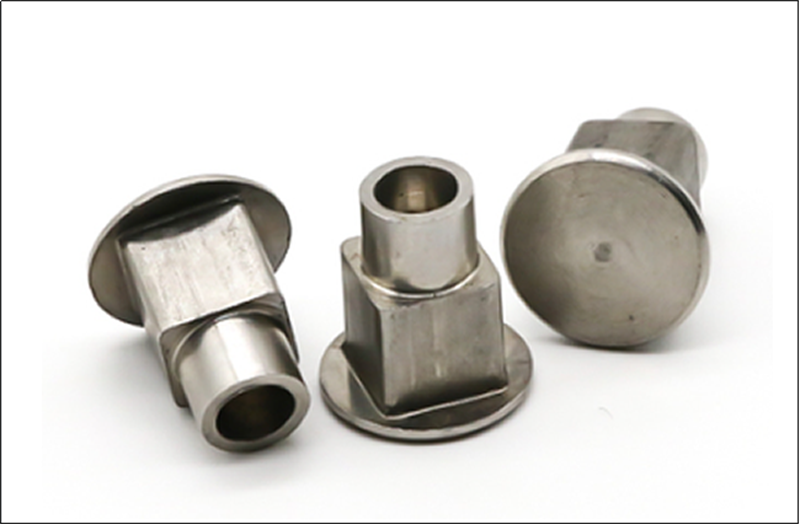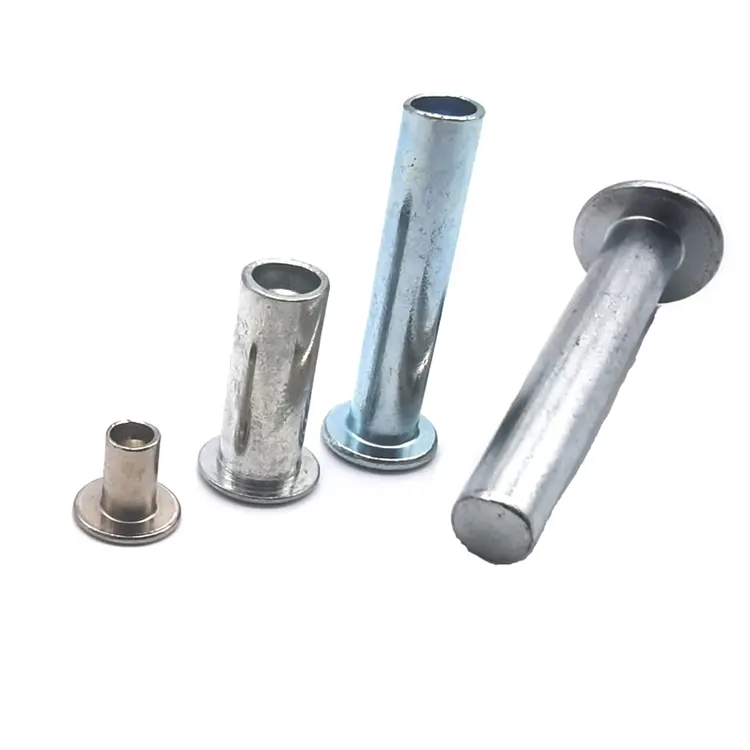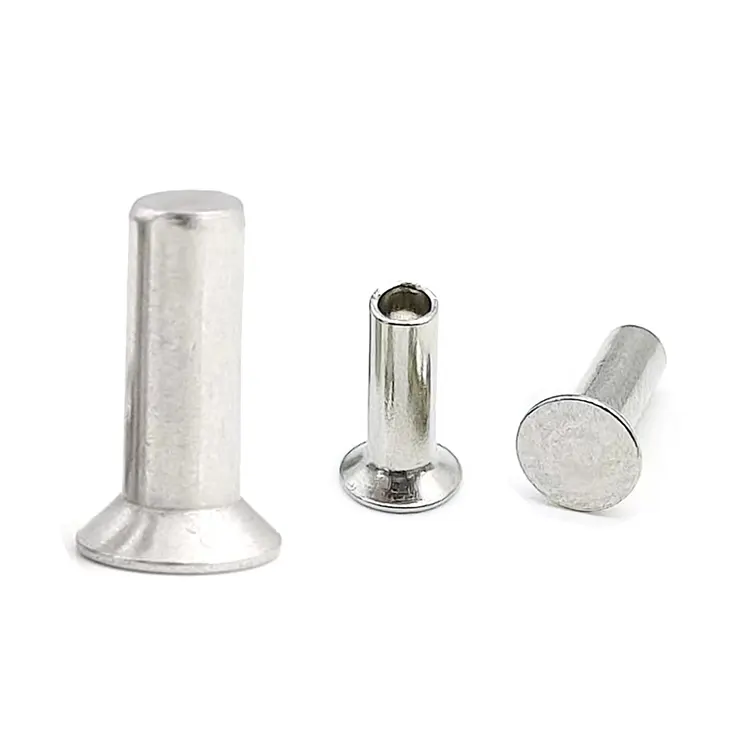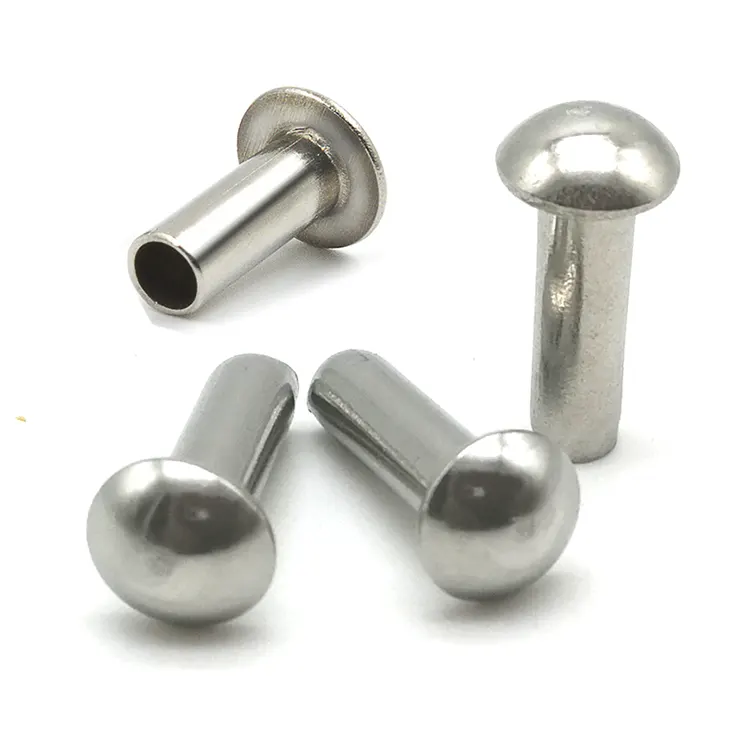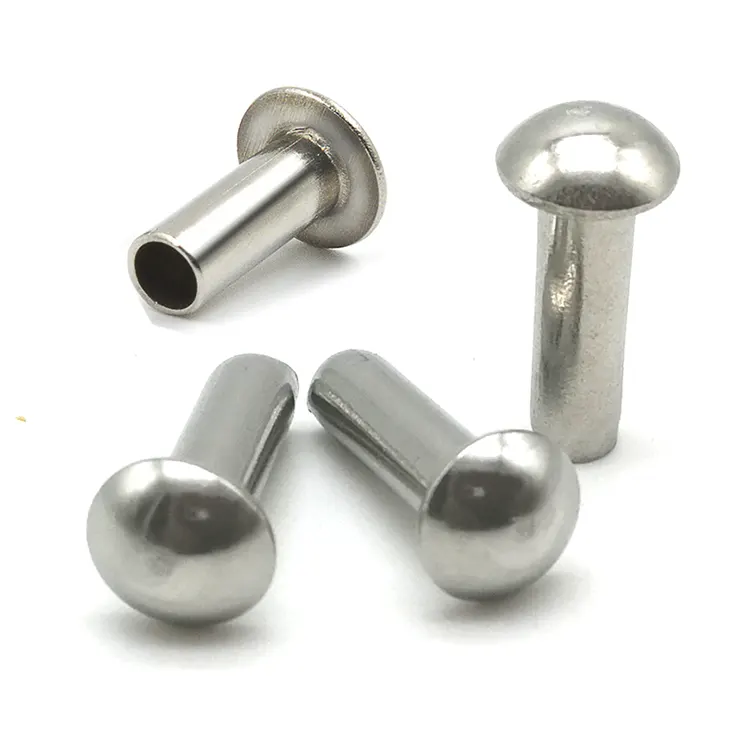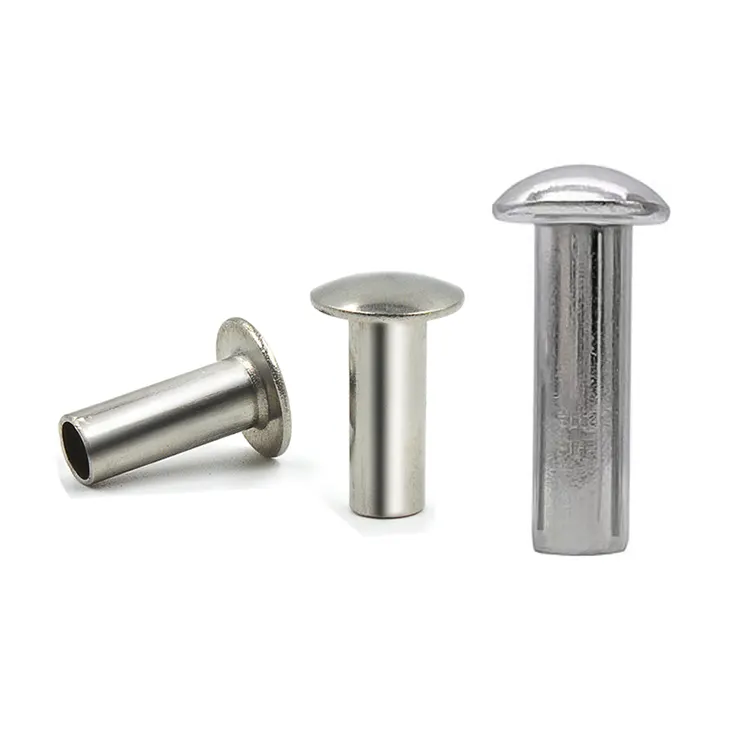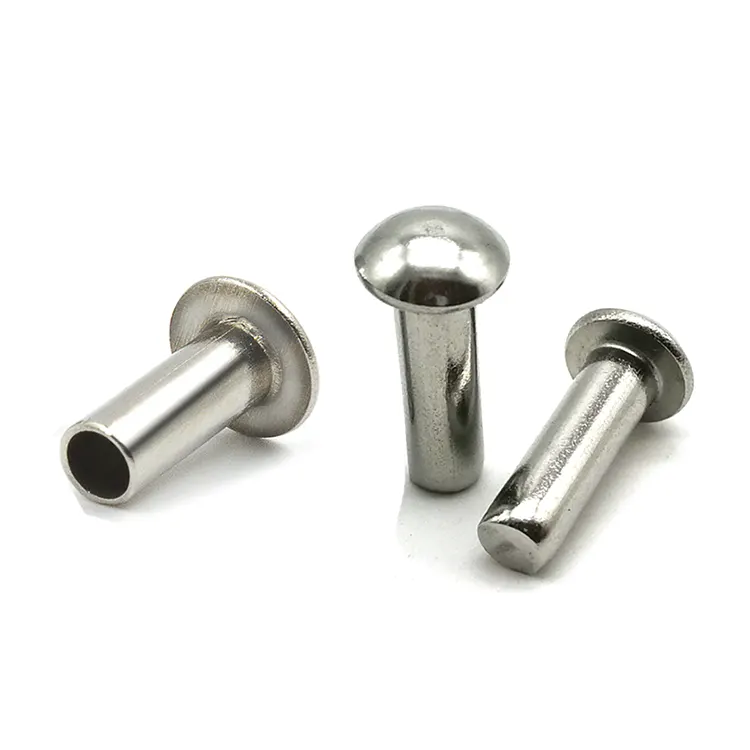Rebites especiais
One of Chinese manufacturer of Special Rivets, offering excellent quality at a competitive price, is Notin. Feel free to get in touch.
In the field of mechanical manufacturing and assembly, rivets are a common fastener used to professionally connect two or more parts. According to the degree of standardization, rivets can be divided into two categories: standard rivets and non-standard rivets. The size, shape and material of standard rivets are uniformly specified, while non-standard rivets are customized according to specific needs. The following will introduce the characteristics and applications of non-standard rivets from multiple aspects.
What are non-standard rivets?
Non-standard rivets are also called special rivets. They refer to rivets that do not meet national standards or industry general standards. Their size, material, structure and other parameters are designed and manufactured according to the specific needs of customers. Due to the different connection requirements of different industries and equipment, standard rivets may not meet the requirements of certain special scenarios, so non-standard rivets came into being.
What are the characteristics of special rivets?
(1) Strong customization: Non-standard rivets can be personalized according to factors such as the use environment, stress conditions, and assembly methods to ensure that they perform well in actual applications.
(2) Diverse materials: In addition to common carbon steel and stainless steel, non-standard rivets can also be made of special materials such as aluminum alloy, copper alloy, titanium alloy, etc. to meet different corrosion resistance, strength and weight requirements.
(3) Flexible structure: The structure of non-standard rivets can be adjusted according to needs, such as head shape, stem diameter, length, etc., and can even be designed to be hollow, semi-hollow or other special shapes.
- View as
Rebites de cabeça plana de aço
Os rebites de cabeça plana de aço conectam os componentes com segurança através de deformação ou ajuste interferente, garantindo que eles permaneçam inseparáveis e adequados para aplicações sujeitas a cargas gerais. Eles também podem ter acabamento com níquel, zinco branco, zinco azul, zinco preto, zinco colorido, cobre ou cromagem para atender a diversos ambientes e requisitos estéticos. A Nuote Metals é especializada na produção de rebites de cabeça plana de aço, com envio para todo o mundo. Pedidos personalizados também são bem-vindos.
consulte Mais informaçãoEnviar consultaRebites de cabeça escareada de aço
Os rebites de cabeça escareada de aço são um fixador comumente usado para conectar duas ou mais peças de trabalho. Eles são fixados às peças por meio de martelamento ou força mecânica, criando uma conexão segura. A Nuote Metals é especialista na produção de rebites de cabeça escareada em aço, localizada em Dongguan, China, uma cidade com uma indústria próspera. Nossos rebites apresentam uma superfície lisa e sem rebarbas, revestimento impecável e juntas sem rachaduras. Aceitamos consultas e pedidos.
consulte Mais informaçãoEnviar consultaRebites de cabeça redonda de aço inoxidável
Os rebites de cabeça redonda oferecem excelente resistência à corrosão. Isto é especialmente verdadeiro para os rebites de cabeça redonda de aço inoxidável 304, que são feitos de aço inoxidável 304, um material conhecido por sua excelente resistência à corrosão, boa trabalhabilidade e acabamento esteticamente agradável. O aço inoxidável 304 resiste ao ataque de uma ampla gama de produtos químicos, tornando-o ideal para uso em ambientes úmidos e corrosivos. Como resultado, os rebites de cabeça redonda de aço inoxidável 304 oferecem uma vida útil mais longa em ambientes externos ou úmidos, são menos propensos à ferrugem e oferecem baixos custos de manutenção.
consulte Mais informaçãoEnviar consultaRebites de aço inoxidável
Nuote Metals é um fabricante profissional de rebites. Produzimos rebites com alta precisão, superfície de corte plana e superfície lisa e esteticamente agradável. Os rebites de aço inoxidável são fixadores de metal comuns, usados principalmente em aplicações de conexão especializadas ou de alta resistência. Eles consistem em uma haste e uma tampa. A força externa deforma a haste, conectando firmemente duas ou mais peças de trabalho. Esses rebites oferecem alta resistência à tração e ao cisalhamento, tornando-os adequados para uso em diversas aplicações industriais.
consulte Mais informaçãoEnviar consultaRebites de cabeça panela de aço inoxidável
Nuote Metals é um fabricante confiável de rebites na China, produzindo rebites em uma variedade de materiais, incluindo latão, ferro, alumínio, aço inoxidável e cobre. Os rebites de cabeça panela de aço inoxidável são a escolha ideal para inúmeras indústrias devido às suas excelentes propriedades de fixação, resistência superior à corrosão, especificações diversas e ampla gama de aplicações. Seja na fabricação industrial, decoração arquitetônica, fabricação automotiva ou bricolagem doméstica, os rebites de cabeça panela de aço inoxidável fornecem uma solução de conexão confiável, adicionando uma camada de segurança a qualquer projeto.
consulte Mais informaçãoEnviar consultaRebites de cabeça de cogumelo de aço inoxidável
A Nuote Metals é especializada na produção de rebites com cabeça de cogumelo em aço inoxidável. Nossos rebites de aço inoxidável apresentam um acabamento brilhante. Desde o armazenamento da matéria-prima até a produção e envio, controlamos rigorosamente cada detalhe para garantir que cada rebite seja entregue aos nossos clientes com aparência e dimensões impecáveis. Feitos de aço inoxidável, esses rebites em forma de cogumelo são resistentes à corrosão e possuem fortes propriedades mecânicas. Eles são amplamente utilizados em aplicações de rebitagem, como malas, roupas e equipamentos industriais.
consulte Mais informaçãoEnviar consultaWhat are the characteristics of special rivets?
(1) Strong customization: Non-standard rivets can be personalized according to factors such as the use environment, stress conditions, and assembly methods to ensure that they perform well in actual applications.
(2) Diverse materials: In addition to common carbon steel and stainless steel, non-standard rivets can also be made of special materials such as aluminum alloy, copper alloy, titanium alloy, etc. to meet different corrosion resistance, strength and weight requirements.
(3) Flexible structure: The structure of non-standard rivets can be adjusted according to needs, such as head shape, stem diameter, length, etc., and can even be designed to be hollow, semi-hollow or other special shapes.
Manufacturing process of special rivets
The manufacturing of non-standard rivets involves multiple links, mainly including:
1.Material selection: Select suitable metal or alloy materials according to the use environment. 2. 2.Cold heading or hot heading: Use pressure processing to form the basic shape of the rivet into the metal blank.
3.Turning or milling: Fine-process the details such as the head and stem of the rivet to ensure dimensional accuracy.
4.Surface treatment: Such as galvanizing, nickel plating, anodizing, etc. to improve corrosion resistance or aesthetics.
Advantages and limitations of special rivets
(1) Advantages: They can meet special needs, improve assembly efficiency and connection reliability, and are suitable for complex or high-demand application scenarios.
(2) Limitations: Since they are customized products, the production cost is high, the delivery cycle is relatively long, and customers are required to provide detailed technical parameters.
How to choose suitable special rivets?
(1) Clarify the needs: Determine the key parameters such as the rivet's operating environment, stress conditions, and corrosion resistance requirements.
(2) Material matching: Select the appropriate material based on actual needs to avoid over-design that leads to increased costs.
(3) Communicate with suppliers: Provide detailed technical drawings or samples to ensure that the non-standard rivets produced meet expectations.
What are the main applications of special rivets?
(1) Aerospace: Aircraft, rockets and other equipment have extremely high requirements for the weight, strength and high-temperature resistance of fasteners. Non-standard rivets can be optimized according to specific needs.
(2) Automobile manufacturing: Certain special models or high-performance vehicles may require non-standard rivets to meet the needs of lightweight or high-strength connections.
(3) Electronic equipment: Precision instruments or small electronic equipment may require micro non-standard rivets to ensure the stability and compactness of the connection.
(4) Construction industry: Some special-structured buildings or decoration projects may use non-standard rivets to meet specific installation requirements.
Market status of special rivets
With the advancement of industrial technology, more and more industries have begun to use non-standard rivets to optimize product design. At present, non-standard rivet manufacturers are mainly concentrated in the Yangtze River Delta and Pearl River Delta regions in China, and can provide a variety of customized services. Due to the high unit price of non-standard rivets, its market size is relatively small, but the demand in the high-end manufacturing field continues to grow.
Future development trends
(1) Lightweight design: With the improvement of energy-saving and environmental protection requirements, non-standard rivets made of lightweight materials will be more popular.
(2) Intelligent production: Automated equipment and digital management will further improve the production efficiency and quality stability of non-standard rivets.
(3) Wider application: Emerging industries such as new energy and robotics may drive the growth of demand for non-standard rivets.
In summary, special rivets are highly customized fasteners that can meet special needs that standard rivets cannot meet. Although its production cost is relatively high, it plays an irreplaceable role in industries such as aerospace, automobiles, and electronics. In the future, with the advancement of manufacturing technology, the application scope of non-standard rivets is expected to further expand.






